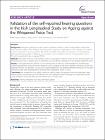| dc.contributor.author | SETTI, ANNALISA | en |
| dc.contributor.author | CRONIN, HILARY | en |
| dc.contributor.author | KENNY, ROSE | en |
| dc.date.accessioned | 2014-07-22T14:32:08Z | |
| dc.date.available | 2014-07-22T14:32:08Z | |
| dc.date.issued | 2014 | en |
| dc.date.submitted | 2014 | en |
| dc.identifier.citation | Kenny Gibson W, Cronin H, Kenny RA, Setti A., Validation of the self-reported hearing questions in the Irish Longitudinal Study on Ageing against the Whispered Voice Test., BMC Res Notes., 14, 7, 2014, 361- | en |
| dc.identifier.other | Y | en |
| dc.identifier.uri | http://hdl.handle.net/2262/70462 | |
| dc.description | PUBLISHED | en |
| dc.description.abstract | BACKGROUND:
Self report questions are often used in population studies to assess sensory efficacy and decline. These questions differ in their validity in assessing sensory impairment depending on the wording of the question and the characteristics of the population. We tested the validity of the self-report questions on hearing efficacy (self reported hearing, ability in following a conversation, use of a telephone and use of hearing aids) used in The Irish Longitudinal Study on Ageing (TILDA).
METHODS:
We tested sensitivity and specificity, positive and negative predictive values of each question against the Whispered Voice Test, a relatively easy to administer and cost effective alternative to the standard audiometric test.
RESULTS:
In this population the question 'Is your hearing (with or without a hearing appliance)/ Excellent/Very Good/Good/Fair/Poor?' showed the best diagnostic value in relation to the other questions (sensitivity 55.56% and specificity 94.67%). The question 'Can you use a normal telephone?' was deemed ineffective because of a very poor sensitivity (5.56%) and was proposed for exclusion from subsequent waves of TILDA.
CONCLUSIONS:
We showed that this validity check was useful to select the questions that most effectively assess hearing deficits and provided crucial information for the subsequent waves. We argue that longitudinal studies using self-reports of sensory efficacy would benefit from a similar check. | en |
| dc.format.extent | 361 | en |
| dc.language.iso | en | en |
| dc.relation.ispartofseries | BMC Res Notes. | en |
| dc.relation.ispartofseries | 14 | en |
| dc.relation.ispartofseries | 7 | en |
| dc.rights | Y | en |
| dc.subject | Aging | en |
| dc.title | Validation of the self-reported hearing questions in the Irish Longitudinal Study on Ageing against the Whispered Voice Test. | en |
| dc.type | Journal Article | en |
| dc.type.supercollection | scholarly_publications | en |
| dc.type.supercollection | refereed_publications | en |
| dc.identifier.peoplefinderurl | http://people.tcd.ie/croninhi | en |
| dc.identifier.peoplefinderurl | http://people.tcd.ie/asetti | en |
| dc.identifier.peoplefinderurl | http://people.tcd.ie/rkenny | en |
| dc.identifier.rssinternalid | 95392 | en |
| dc.identifier.doi | http://dx.doi.org/10.1186/1756-0500-7-361. | en |
| dc.rights.ecaccessrights | openAccess | |
| dc.subject.TCDTheme | Ageing | en |
| dc.subject.TCDTheme | Neuroscience | en |
| dc.subject.TCDTag | Age related diseases | en |




